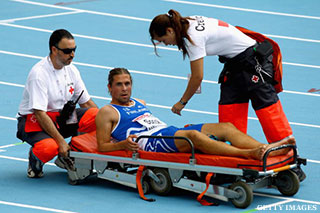
Popping painkillers before a long race could actually make pain much worse, says a new study in BMJ Open.

Marathon and half-marathon participants who consumed over-the-counter analgesics -- diclofenac, ibuprofren, and aspirin -- before the 2010 Bonn Marathon in Germany were five times more likely to experience adverse side effects like gastrointestinal issues, haematuria (blood in urine), stomach cramps, and heart palpitations during their run than those who stuck to a pill-free pre-race ritual.
There was also a positive correlation between dosage and risk. So the more milligrams runners took, the higher their chances of suffering (even more than normal).
What's up? Painkillers reduce the production of protective hormones called prostaglandins, says study author Kay Brune, Ph.D. The blockage of that production then aggravates the stress exerted by long-distance running. “Between this stress and the drugs, the GI-tract, kidney, and cardiovascular systems are overrun,” Brune says.
(Rewrite your running bucket list with one of these 11 Best Races to Run in the World.)
Of the 49 percent of runners who reportedly popped pills, only 11 percent said they were already in pain before the race; the rest were simply being cautious. None of them seemed to know the risks involved.
“Bottom line: If you're not in pain, don't take painkillers,” says Reed Ferber, Ph.D., director of the Running Injury Clinic at the University of Calgary. “You’re putting yourself at a metabolic disadvantage, because now your body is fighting to get those pills out of your system, rather than focusing on the very important task at hand.”
And if you are in pain? Don't take painkillers. "They'll simply mask critical signals that you need from your body about when to reduce your intensity, or stretch, or stop running," says Ferber. If you feel pain in training, the best thing you can do is ask a sports medicine doctor to help you figure out what the root cause of that pain is, and then address it fast. "With proper rehab, you can significantly increase strength and cut your pain in half in just three weeks," Ferber says.
If you’re not on the verge of a serious injury, but still need a little pain relief on race day, Ferber recommends a more natural, temporary fix, like Kinesio Tape, compression sleeves or a Cho-Pat Knee Strap.
Meanwhile, save the Motrin for when you’ve finished your last mile. “For most people, pain at the end of a long race is unavoidable, and it’s okay to take painkillers then,” says Brune. “But if you’re in pain from the start, you’re probably better off not participating.”
Medications aside, diagnose your pain with this guide to every ache and twinge. Learn The Top 5 Running Injuries--And How to Treat Them.




